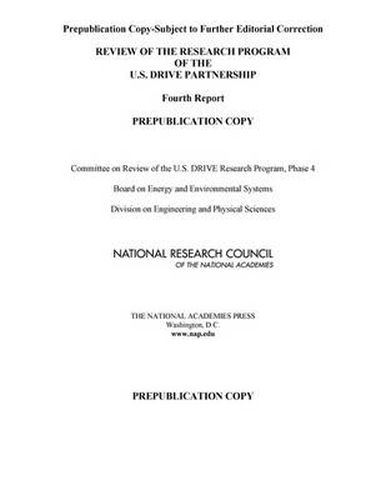Readings Newsletter
Become a Readings Member to make your shopping experience even easier.
Sign in or sign up for free!
You’re not far away from qualifying for FREE standard shipping within Australia
You’ve qualified for FREE standard shipping within Australia
The cart is loading…






Review of the Research Program of the U.S. DRIVE Partnership: Fourth Report follows on three previous NRC reviews of the FreedomCAR and Fuel Partnership, which was the predecessor of the U.S. DRIVE Partnership (NRC, 2005, 2008a, 2010). The U.S. DRIVE (Driving Research and Innovation for Vehicle Efficiency and Energy Sustainability) vision, according to the charter of the Partnership, is this: American consumers have a broad range of affordable personal transportation choices that reduce petroleum consumption and significantly reduce harmful emissions from the transportation sector. Its mission is as follows: accelerate the development of pre-competitive and innovative technologies to enable a full range of efficient and clean advanced light-duty vehicles (LDVs), as well as related energy infrastructure. The Partnership focuses on precompetitive research and development (R&D) that can help to accelerate the emergence of advanced technologies to be commercialization-feasible.
The guidance for the work of the U.S. DRIVE Partnership as well as the priority setting and targets for needed research are provided by joint industry/government technical teams. This structure has been demonstrated to be an effective means of identifying high-priority, long-term precompetitive research needs for each technology with which the Partnership is involved. Technical areas in which research and development as well as technology validation programs have been pursued include the following: internal combustion engines (ICEs) potentially operating on conventional and various alternative fuels, automotive fuel cell power systems, hydrogen storage systems (especially onboard vehicles), batteries and other forms of electrochemical energy storage, electric propulsion systems, hydrogen production and delivery, and materials leading to vehicle weight reductions.
$9.00 standard shipping within Australia
FREE standard shipping within Australia for orders over $100.00
Express & International shipping calculated at checkout
Review of the Research Program of the U.S. DRIVE Partnership: Fourth Report follows on three previous NRC reviews of the FreedomCAR and Fuel Partnership, which was the predecessor of the U.S. DRIVE Partnership (NRC, 2005, 2008a, 2010). The U.S. DRIVE (Driving Research and Innovation for Vehicle Efficiency and Energy Sustainability) vision, according to the charter of the Partnership, is this: American consumers have a broad range of affordable personal transportation choices that reduce petroleum consumption and significantly reduce harmful emissions from the transportation sector. Its mission is as follows: accelerate the development of pre-competitive and innovative technologies to enable a full range of efficient and clean advanced light-duty vehicles (LDVs), as well as related energy infrastructure. The Partnership focuses on precompetitive research and development (R&D) that can help to accelerate the emergence of advanced technologies to be commercialization-feasible.
The guidance for the work of the U.S. DRIVE Partnership as well as the priority setting and targets for needed research are provided by joint industry/government technical teams. This structure has been demonstrated to be an effective means of identifying high-priority, long-term precompetitive research needs for each technology with which the Partnership is involved. Technical areas in which research and development as well as technology validation programs have been pursued include the following: internal combustion engines (ICEs) potentially operating on conventional and various alternative fuels, automotive fuel cell power systems, hydrogen storage systems (especially onboard vehicles), batteries and other forms of electrochemical energy storage, electric propulsion systems, hydrogen production and delivery, and materials leading to vehicle weight reductions.